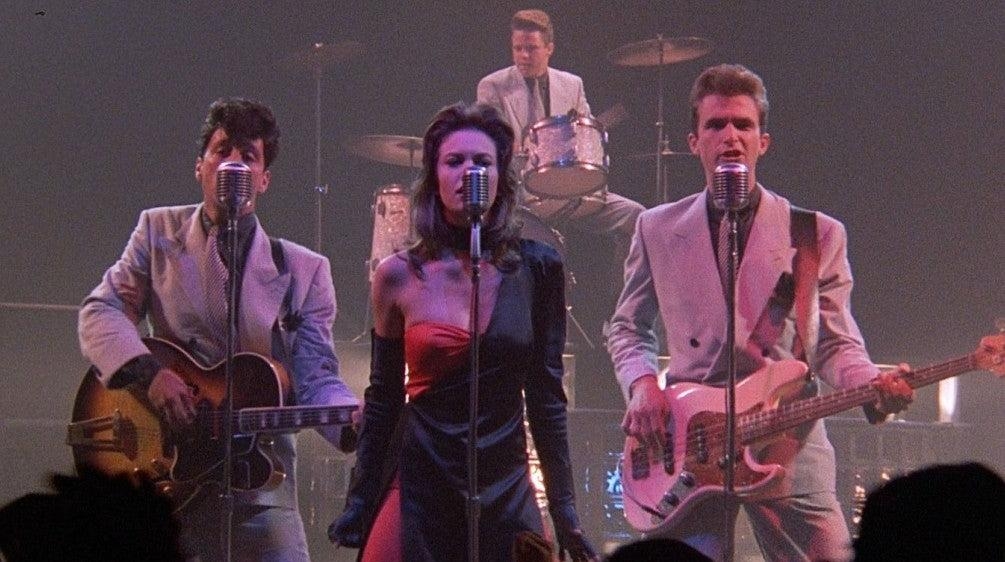Streets Of Fire‘s rockin’ soundtrack backed up its macho madness in style
A certified pop hit, Meat Loaf’s composer, and still-unreleased Ry Cooder music set the tone for the slick neo-noir
Film Features Streets of Fire
Fresh from making Eddie Murphy a star in the hit buddy cop comedy 48 Hrs., Walter Hill, a filmmaker known for genre flicks about men doing a lot of manly shit, had the idea to do, according to the opening credits, a “rock and roll fable” set in “another time, another place.”
In Streets Of Fire, a rock goddess named Ellen Aim (Diane Lane) gets kidnapped by rowdy motorcycle gang The Bombers (led by a moussed-up Willem Dafoe), and it’s up to Aim’s badass ex Tom Cody (Michael Paré) to save her. This hardboiled, high-octane fantasy—with its muscle cars, pompadour hairstyles, explosive action sequences, and an overall sense of authority-defying rebellion—almost seems like a test run for Frank Miller’s Sin City graphic novel (which eventually was turned into a couple movies by Robert Rodriguez).
Streets Of Fire also has a rockin’ soundtrack. Although this Joel Silver-produced neo-noir looks like it’s set in a Chicago that’s stuck in the ‘50s, many of the songs still exhibit an ‘80s-era poppiness. (The closing-credits number “Deeper and Deeper” is performed by British pop/rock group The Fixx, best known for that ‘80s radio staple “One Thing Leads to Another.”)
Several people are responsible for the music. Future record mogul/Beats Electronics co-founder Jimmy Iovine produced five tracks, while Jim Steinman, who composed and produced many of Meat Loaf’s classic works, created a Wagnerian studio project called Fire Inc. for two anthemic rock numbers (“Nowhere Fast” and “Tonight Is What It Means to Be Young”) that Aim and her band, Ellen Aim and the Attackers, performs. Steinman came up with “Tonight” in two days when the filmmakers couldn’t get the rights to Bruce Springsteen’s “Streets of Fire,” a song whose title Hill took for the film. They filmed an ending using “Streets of Fire,” but they had to trash that and do a new one with Steinman’s song.
Lane’s singing voice is provided by two performers: Laurie Sargent of the Boston new-wave band Face to Face (whose members appear in Streets Of Fire as the Attackers) and longtime Steinman session player Holly Sherwood. Sargent does the lead vocals on “Nowhere Fast” as well as “Sorcerer,” a Stevie Nicks composition that’s performed on the soundtrack album by Marilyn Martin, and “Never Be You,” which was written by Tom Petty & fellow Heartbreaker Benmont Tench and performed on the album by Maria McKee.
Lane isn’t the only one who lip-syncs in this. The actual top-ten hit “I Can Dream About You,” performed in the movie by moonwalking, Black doo-wop group The Sorels (which includes ‘80s heartthrob Stoney Jackson, Hollywood Shuffle writer/director/star Robert Townsend and Forrest Gump’s Mykelti Williamson), was actually written and performed by a white dude, the late Dan Hartman. The Sorels also do an acapella version of “Countdown to Love,” with Jackson lip-synching Winston Ford’s vocals. Veteran singer/keyboardist Greg Phillinganes performs the tune with a full band on the soundtrack.
California rock band The Blasters, who turned down a chance to appear in 48 Hrs., appears as the resident band at Torchie’s, the Bombers’ hangout. They perform two tunes: “One Bad Stud” (written by legendary songwriting duo Jerry Lieber and Mike Stoller) and “Blue Shadows” (penned by Blasters frontman Dave Alvin), as a gal (French dancer Marine Jahan) wearing a sheer bodysuit, a thong and a half-shirt, dances all over the bartop.
As for the rockabilly-flavored score, that was done by guitarist Ry Cooder, who had been Hill’s regular music man all through the ‘80s and ‘90s, going all the way back to the 1980 Western The Long Riders. The score was actually composed for the Burt Reynolds racing movie Stroker Ace, until director Hal Needham hated the music and fired Cooder from the project.
His Ry Cooder Band performs several tunes for the score, including Bob Seger’s “Get Out of Denver,” Duane Eddy and Lee Hazlewood’s “First Love, First Tears” and Link Wray’s “Rumble.” However, Cooder’s original composition “Hold That Snake” is the only one that made it to the album. Apart from “Bomber Bash,” which appeared on his 1995 Music by Ry Cooder compilation, Cooder’s Streets Of Fire score still remains unreleased, making it something of a white whale for Cooder completists.
Streets Of Fire was ultimately a flop, grossing $8 million against its $14.5 million. The reviews were mixed — Siskel and Ebert had opposing thumbs on this one. You can hardly blame audiences for staying away from a macho, maverick clusterfuck about some meathead dudes (which also includes an overly obnoxious Rick Moranis as Aim’s manager/boyfriend) who basically spend the whole time fighting over Lane.
If anything, Streets Of Fire is an example of how Hollywood used to give successful filmmakers an opportunity to do whatever they wanted, no matter how batshit-crazy it looked and sounded. Hill was given a blank check to make, as my friend Sean Burns once perfectly described, “an extravagantly stylized pulp burlesque that is at once an objectively lousy picture and just about the coolest damn thing I’ve ever seen.” Thankfully, Hill brought along a bunch of game musicians to provide memorable music for all this manly madness.